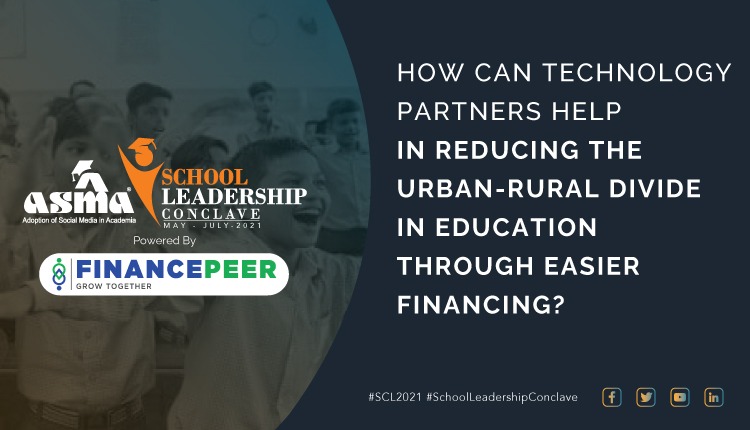The Urban-Rural Divide is Not Only Technology-Based But Also Quality-Based, Says School Education Leaders
The panel on ASMA School Leadership Conclave powered by Financepeer discussed how technology partners can help in reducing the urban-rural divide in education through easier financing’
The second edition of the ASMA School Leadership Conclave powered by Financepeer was held on 15th June 2021. The virtual event brought together leaders from the school education sector to discuss ‘How technology can partners help in reducing the urban-rural divide in education through easier financing’.
The esteemed panel comprised Anisha Sharma, Principal, Delhi Public School, West Bengal, Dr Shruti Aeron Gupta, Director & Founder, Brilliant Public Chain of Schools, Nellie Ahmed Tanweer, Founder, Maria’s Public School, Assam and Nitesh Mahajan, Business Head – East Zone, Financepeer.
The panel was moderated by Dr Sanjay Suar, Principal, KIIT International School, Bhubaneswar.
The session began with Nitesh Mahajan, Business Head – East Zone, Financepeer taking the audience through the various ways Financepeer helps education institutions, parents and students to finance education in a simple, hassle-free process. Mahajan explained, “Financepeer pays the entire year’s fee to the institutions, this provides schools with the working capital that can be used to invest in their infrastructure and to develop digital labs, etc”.
The panel discussion began with moderator Dr Sanjay Suar, Principal, KIIT International School, Bhubaneswar remarking, “The urban-rural divide is very well experienced in many areas such as income distribution, education, employment, quality of social life, health, digital inequalities and digital infrastructure, etc”.
The discussion then delved into ways educators can work with technology partners to bridge the urban-rural divide in education.
Anisha Sharma, Principal, Delhi Public School, West Bengal pointed out that quality education is one of the main factors contributing to this divide between urban and rural India. She said, “The gap in education does not only refer to the online-offline mode of learning and technology-based, it is also quality-based. Rural teachers usually do not have any professional or skill development training. Another factor that causes the gap is the lack of resources”.
Building on this and adding her unique perspective to the discussion, Dr Shruti Aeron Gupta, Director & Founder, Brilliant Public Chain of Schools explained that rural India, is in essence India, therefore there should be a focus on making education, particularly digital learning, more accessible to these areas.
She said, “When we talk about our society, we cannot move a step ahead without thinking about our roots. We are a rural India and an India that breathes through its rural communities, I believe that unless we as elite schools and educators hand-hold our rural groups, we are totally mismatched to our society and we would not be able to reach the whole idea of ‘vasudhaiva kutumbakam‘ (the world is one family) because you cannot give access to one child and leave the other without”.
Dr Gupta also added, “Instead of talking about rural and urban, we should talk about the privileged and underprivileged, because there are a lot of children even in urban areas who are totally untouched by the availability of resources”.
Echoing similar sentiment, Nellie Ahmed, Founder, Maria’s Public School, Assam said, “This pandemic has not only taught us to be techno-savvy but also take care of the mental well-being of children. As educators, we need to share our projects to bring the rural areas closer to us”.
The panel also agreed that technology partners such as Financepeer play an integral role today in facilitating and empowering rural and lower-income communities to achieve their education goals, particularly in the time of the pandemic. The esteemed panellists also agreed that it is not only the responsibility of the government to work towards bridging the urban-rural gap in education, but is also that of educators, EdTech and technology partners and those in the wider private sector.



